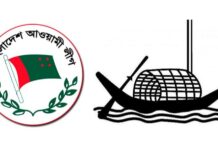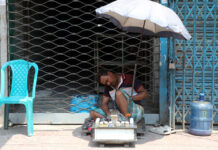By Ahammad Foyez on Mar 28, 2022 Benar News
In her first public comment on the issue, Bangladesh’s prime minister lashed out Monday at the U.S. for “abominable” sanctions against the Rapid Action Battalion force over alleged human rights abuses, saying Washington imposed them without “any fault or cause.”
Sheikh Hasina’s remarks at an event marking the anniversary of RAB’s creation came a week before the Bangladeshi foreign minister was to hold high-level talks with U.S. officials in Washington.
Among a range of bilateral issues during meetings on April 4 and 6, the two sides are expected to discuss American sanctions placed on the security force in December 2021 over its alleged role in enforced disappearance and extrajudicial killings.
“Imposing sanctions [on RAB and some of its officials] after all these successes is very much an abominable act,” Hasina said in a virtual message during a ceremony marking 18th anniversary of RAB’s founding, at its headquarters in Dhaka.
On Dec. 10, the U.S Treasury Department issued sanctions against RAB and seven serving and former officials over allegations of grave violations of human rights. The move angered Bangladeshi government officials.
Former RAB Director General Benazir Ahmed – now Bangladesh’s inspector general of police – is among the sanctioned officials. He is barred from entering the United States.
Hasina made the comment days after U.S. Under Secretary for Political Affairs Victoria Nuland visited Bangladesh to discuss bilateral issues and ahead of a scheduled visit by Foreign Minister A.K. Abdul Momen to Washington.
Before leaving Dhaka, Nuland acknowledged that the human rights climate had improved in the South Asian country but said Bangladesh’s government needed to do more to hold RAB accountable for alleged rights abuses.
In her statement on Monday, Hasina also accused Washington of protecting and sheltering criminals, while ordering sanctions against Bangladesh where, she said, there is no crime.
“This is their character, so what else can I say about them? In their country they do not take any action against any member of their forces [law enforcement agencies] for their criminal activities,” she said.
The prime minister was referring to cases of police brutality and extrajudicial killings in the United States, including one where a Minneapolis police officer was convicted of killing George Floyd by kneeling on his neck during an arrest in May 2020.
Bangladesh, by comparison, is the only country where anyone from any law enforcement agency involved in any crime must be punished, the PM claimed.

Hasina also questioned whether U.S. authorities were bothered by Bangladesh’s successes against militants, drugs and terrorists including those responsible for carrying out a massacre of hostages during an overnight siege at the Holey Artisan Bakery café in July 2016 – the country’s worst-ever terror attack.
She also criticized American officials for sheltering a killer of her father, Bangladesh’s founding president.
“A criminal convicted in the killing of Bangabandhu Sheikh Mujibur Rahman is staying in the U.S.,” she said, referring to her father.
“We requested the U.S. send him back, but they gave protection in their country and sheltered the criminal while they imposed sanctions on some RAB officials without any fault or cause,” Hasina said.
In 2009, former Bangladesh Army officer Rashed Chowdhury was convicted and sentenced to death in absentia for his role in the coup that led to Sheikh Mujibur’s assassination in 1975. He fled to the U.S. in 1996 when Hasina took power and was later granted asylum, according to media reports.
On Monday, officials at the U.S. Embassy in Dhaka did not immediately respond to BenarNews requests for comment in response to Hasina’s criticism.
In Washington, a State Department spokesperson referred questions to the U.S. Treasury, saying it was that agency which had placed RAB under sanctions framed by Executive Order 13818. Treasury officials, in turn, could not be immediately reached.









